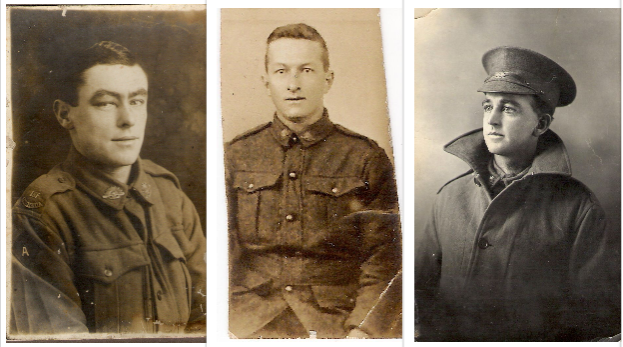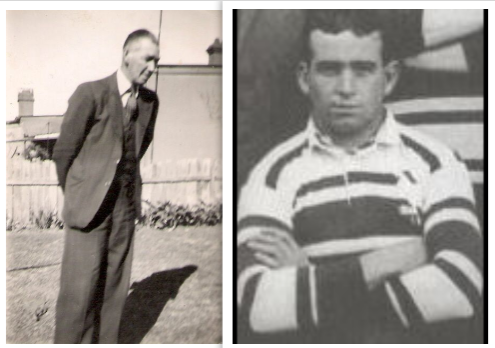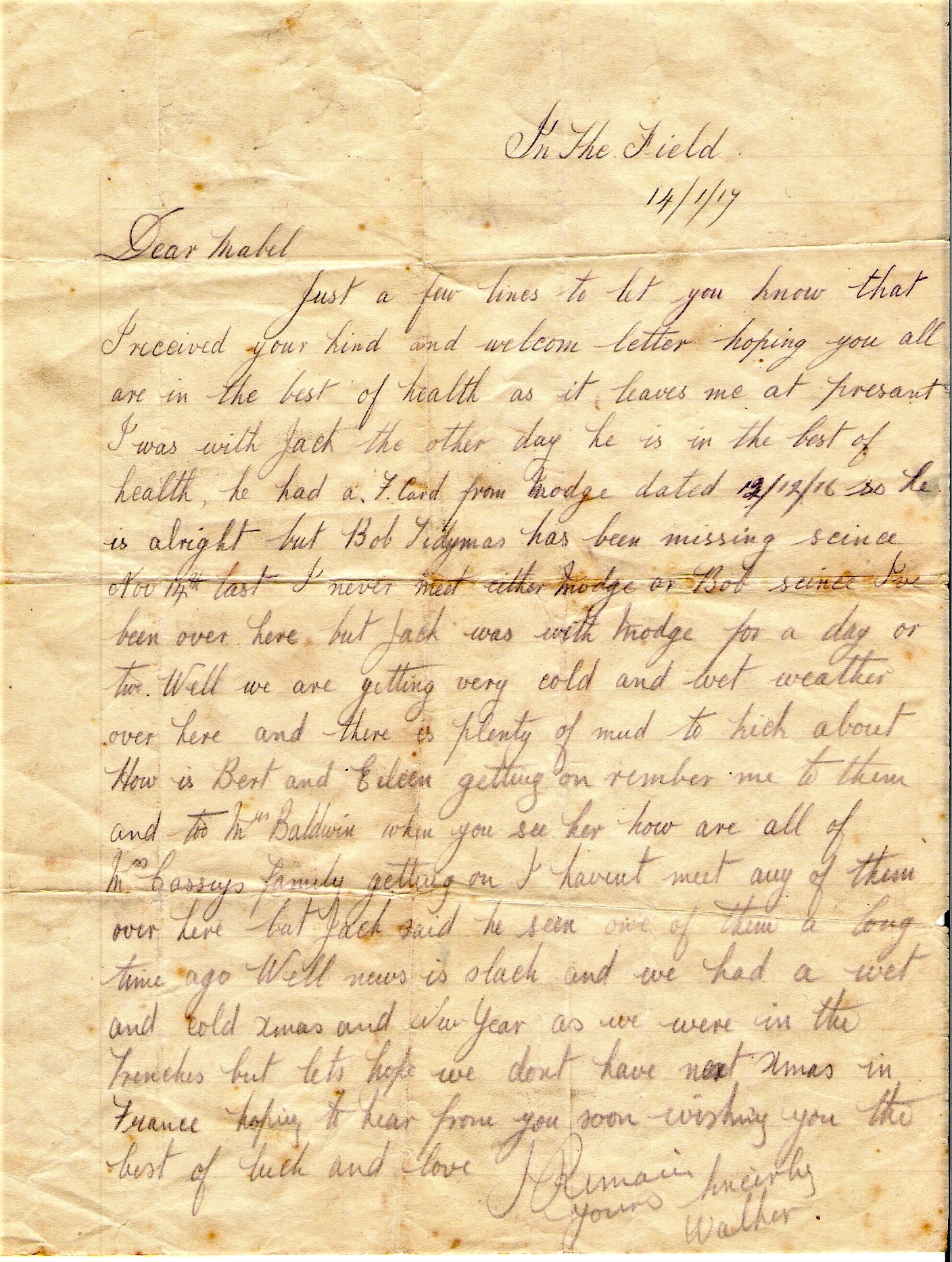10 minute read
In the lead up to Anzac Day each year, I tend to post something to do with members of my family who fought during one of the world wars. This year I’d like to focus on a slightly different aspect; that of those left behind on the home front. With so many of us staying home and fighting our own battles at the moment, whether that be physical or mental during this time of crisis, I wanted to step back into the lives of some of the women left to cope at home during WW1. Many years ago, whilst studying for my history degree, I came across some folk associated with my three great uncles that served during WW1. This is the story of the two sisters of the boys and the two mothers of their six mates from the Woollahra neighbourhood. It is based around two letters, one from the battlefield to the home front and the other from the home front to the War Office.
My uncles belonged to the Quirk family who lived in James St, Woollahra, in Sydney’s eastern suburbs. They were a poor Irish family; their father James died in 1904 and their mother Julia remarried the following year. She died in January 1914. There were five children in the family; three boys and two girls. James Street, where the family lived, is a small laneway just off Oxford Street. The Quirks moved from number 1 to number 3 and then to number 28 James St. They later moved to the adjoining streets of John St and Moncur St. All rather fancy areas now but back then not so. Their neighbours were the Faddy and Tidyman families. When the first world war broke out, the three Quirk brothers, Mick, Jack and Modge (Maurice) Quirk and their stepfather James Stanley enlisted to fight. They were joined by brothers Bob, William and Chris Tidyman and brothers Walter and Fred Faddy. At the time of enlistment, the boys all ranged in age from 19 to 31 years old. I am blessed to have photographs of five of them. I have just one photograph of the women in this story; my great grandmother Eileen, but as I will be featuring her story at a later date, I will share her image then.

Modge, Chris and Walter

Mick and Bob
By 1914 the three Quirk boys were all old enough to fend for themselves, but the two girls, Mabel and Eileen were as yet unmarried and in their early 20s. My great grandmother Eileen married later that year, 1914, but her sister Mabel would not wed until 1917. Jack was the first to enlist a couple of months after war broke out and he was allocated to the 1st Battalion and saw action at Gallipoli. For Robert and Lizzie Tidyman, their three sons all joined up during 1915; William in March, Christopher in September and finally Bob in December. Bob was a promising young footballer for the Eastern Suburbs Roosters and upon enlistment he was allocated to the 19th Battalion, joining his mate Mick Quirk, who joined the same day. Modge Quirk had enlisted the previous March and was also in the 19th Battalion. William and Chris Tidyman and Fred Faddy were initially allocated to the 17th Battalion. Walter Faddy joined the 18th Battalion in March 1916. James Stanley saw two of his step-sons enlist before he himself decided to join up, seeing action initially in the 3rd Battalion, then in three other battalions. For the women left behind to wonder all day, every day, if their sons and brothers were safe, it must have been a stressful time. With news coming via letter or telegram, it could be months between reassurances that all was OK with the boys. A letter I discovered in a family archive in the late 2000s really brought home to me how harrowing the experience of waiting for news must have been.
Walter Faddy had not long landed on the Western Front after months of training, when he penned a letter to Mabel Quirk back home in Sydney. The winter of 1916-17 was one of Europe’s worst but Walter was still in good spirits, or least put on a brave face in his letter to Mabel. ‘There is plenty of mud to kick about’ he wrote from the battlefield in January 1917, describing the scene he witnessed on the Somme. Historical reports show that Europe recorded one of its coldest winters ever that year. Persistent rain created thick mud and added to the misery for those on the battlefield. Walter also wrote of seeing Jack recently, who had been with his brother Modge for a day or two as well. This would have been reassuring news for Mabel and Eileen, who were worried about their siblings, the only close family they had left. Walter’s mention of the disappearance of Bob Tidyman on the Somme brought home the human cost of the war. Just a few weeks after arriving on the Western Front, Bob had been reported missing after an objective to take fifty German prisoners went wrong. He was presumed killed but official word would not arrive for some time.

Walter Faddy’s letter of January 1917 to Mabel Quirk
In August 1917, some nine months after he went missing, Bob’s mother, Lizzie Tidyman, wrote to the War Office seeking news of him. ‘My Bob was a brave, strong and handsome young bloke, who lived for his football and enjoyed a joke’, she wrote in a long letter to the authorities. In a line that would send chills down any mother’s spine, she lamented the day he told her he was going to enlist. ‘My heart leapt to my mouth when he told me the score, he had signed up to play on the killing fields of war.’ She was clearly afraid for the life of her son, who had heeded the call for volunteers to fight in a foreign land, so far from home. Lizzie quoted from Charles Beans’ accounts of the war in her letter, showing she was indeed keeping up with events on the Western Front, potentially deepening her anxiety. Of the Somme offensive in the winter of 1916, the time Bob went missing, Lizzie wrote; ‘Those brave men had stopped smiling – no not even a joke – and you know, that’s not normal for a true Aussie bloke.’ Lizzie wrote of lying awake night after night, imagining the worst for her sons. Lizzie was in receipt of a report from another soldier that described how her Bob had been first over the parapet and had tried to hold the German prisoners until help arrived. She was angry that his great and brave deed had not been acknowledged in some way. Lizzie’s heartache would continue as news of her other son’s fates reached her. Chris would be felled twice by shell shock, in July 1916 and February 1918. William was also wounded in July 1916. Both boys would suffer with influenza during 1918 to add to their trials. For four long years, day in, day out, Lizzie and her family waited for news and an end to the torment of war.
Walter and Fred’s mother Annie Faddy’s personal account of the war is sadly missing from the historical record. She did not write any letters to the War Office so we do not know her feelings of this time. But we do know that the war only added to the stressful situation she had found herself in by this time in her life. Annie was only five years old when she was placed in the Randwick Asylum for Destitute Children after her father died and her mother could not look after her. She would not leave until the age of 12 when she was apprenticed as a domestic servant. Annie then married Walter Faddy in 1885 and the couple had seven children, three girls and four boys. Even before WW1 began, Annie had been engulfed in unimaginable grief. In 1910, her three-year-old son Arthur had been playing at a neighbour’s house when the mother of that house left a pot of hot scolding water on the verandah, intending to wash some dishes. Little Arthur toppled over into the water and was severely burned. He died in hospital days later. An inquest concluded it was an accident but the coroner reprimanded the woman involved and alleged thoughtlessness on her part. The trauma of this event may have contributed to the breakdown of Walter and Annie’s marriage. Walter’s disappearance in March 1914 sent Annie to the police to request that he pay her maintenance for support of herself and the remaining children. With none forthcoming, Annie continued to pursue Walter and by the time of his arrest in 1918, he had racked up 54 pounds’ worth of back maintenance.
It was during this time that her sons Walter and Fred enlisted to fight in Europe. Fred would suffer the usual diseases of war, dysentery and influenza but also a concussion and finally, in April 1918, a gunshot wound to the head that ended his time on the battlefield. Walter fared little better, suffering from deafness and a septic foot around the same time. As news filtered through of the injuries to her sons, a further tragedy struck the family. Their youngest son, Bert, who had been working as a jockey, was killed in a race in Brisbane. He was just 17 years old. It was now June 1918 and Annie had lost two sons and a further two sons were still in the danger zone, a long way from home. One can only imagine the stress she was under and how every letter or telegram that arrived, was met with trepidation. There was no exact confirmation of Fred’s condition in the official army letter to Fred’s sister Lillian Paton, except to say that since no further news had come to hand, it was presumed he was ‘progressing favourably.’ It would be February 1919 before Fred and Walter returned home and Annie and the rest of the family’s worries were put at ease. In June 1919, on the anniversary of jockey Bert’s death, Annie put a notice in the Sydney Morning Herald; ‘I miss you, for I loved you, as memories I recall, the parting with my darling son, was the saddest day of all.’ It is the only time we hear Annie’s voice from the historical record but it gives us a glimpse into her heartache. Her estranged husband Walter died in 1934. Her son Walter died in 1940 and his brother Fred ten years later in 1950; both married and had families. Annie herself lived through the second world war, the only parent of the nine Woollahra boys who did. For Annie, being plunged into another war must have opened old wounds and brought bad memories flooding back. Some of Annie’s grandsons also fought during WW2. Annie herself died in 1955, aged 88, having lived a long life but one which was hopefully filled with some joy with her remaining children and grandchildren.
For Robert and Lizzie Tidyman, the war took a heavy toll. Their precious sons, Chris and William came home in 1919 but had lingering health problems as a result of their injuries. Bob still lies in an unmarked grave somewhere on the Somme and was deeply mourned, not only by his family but the whole of Woollahra and that of the Rugby League community. In January 1921, less than three years after the end of the war, the boys’ father Robert Tidyman died. Lizzie died three months later. She was just 57 years old. The Quirk boys’ stepfather James Stanley would return to Australia where he lived with his second wife, an English girl. Mick Quirk would never marry. Jack Quirk and his wife split up, the pressures of war time contributing to the demise of their marriage. Modge was killed in action at Hangard Wood in April 1918, felled by German machine gun fire. For Annie Faddy and Lizzie Tidyman, the pain of losing their sons was a cross they bore for the rest of their lives. For the Quirk sisters, a shadow would hang over them for decades to come. Eileen kept her brother Modge’s postcards from the war as a reminder of her lost brother. Mick lived with Eileen until he died in 1945 and between the two of them, her children were always reminded of the sacrifices that were made by their family in the name of freedom. Just twenty years after Modge was killed, Eileen watched as her own first born son Billy went off to New Guinea to fight the Japanese during WW2. She knew only too well the possible outcome of his decision to enlist. Billy thankfully came home; one of the lucky ones. Ten years ago, I was able to attend the dawn service in Canberra which was an amazing but sobering experience. I placed a red poppy next to Modge and Bob’s names on the wall at the War Memorial.
But in 2020 it is not only those who fought in the 20th century wars and those lost their lives that we remember but those they left behind on the home front; in particular those mothers that suffered the loss of the fine young men they had raised. We remember the suffering they endured every single day and night, both during the conflict and for years thereafter. We remember them also, this Anzac Day.
